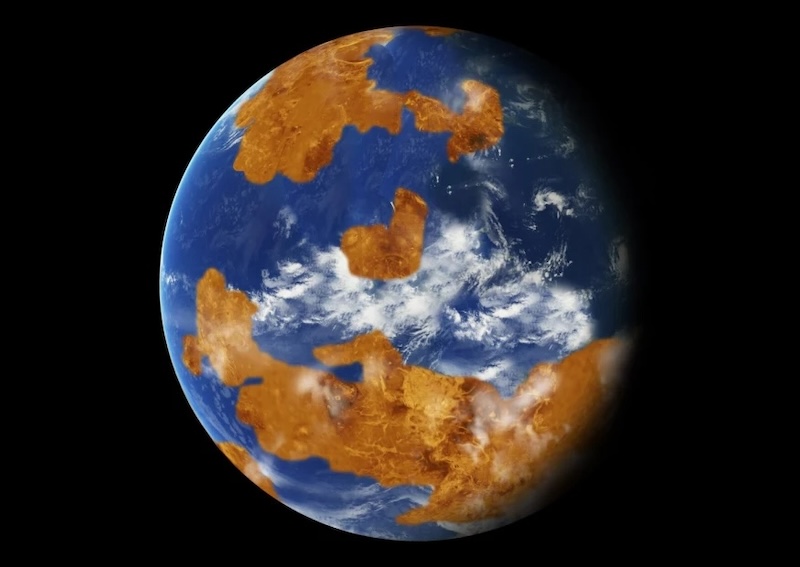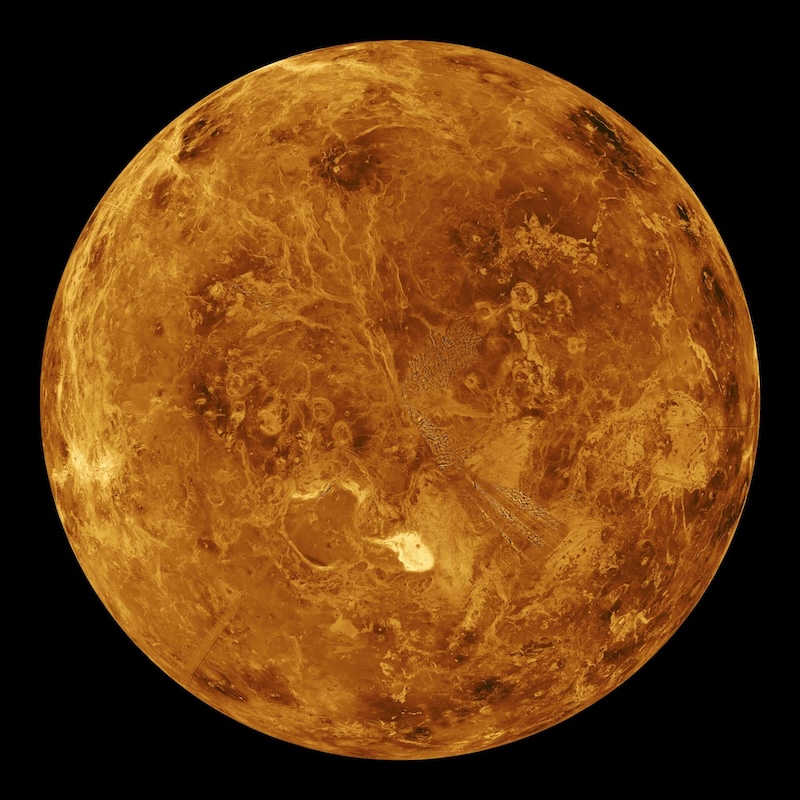
- Water has been gradually escaping Venus’ atmosphere for billions of years. Now scientists think they know why.
- A new study shows the molecule HCO+ may be responsible. Electrons in the atmosphere split the HCO+ ions in two, allowing hydrogen atoms – the H in H2O – from Venus’ atmosphere to escape into space.
- The wrinkle is that HCO+ still hasn’t been confirmed in Venus’ atmosphere. But scientists say it should be there. Future spacecraft with new instruments will be needed to find it.
We sometimes call Venus a “twin” to Earth, since it’s almost the same size and mass as our planet. Yet, somehow, Venus took a very different evolutionary path than Earth. One of the primary differences now is that – while Earth is an ocean world – Venus now has 100,000 times less water than Earth. Yet scientists believe that Venus once likely had just as much water as Earth. What happened? How did Venus lose its water? On May 6, 2024, researchers at the University of Colorado Boulder said their new study suggests that Venus today continues to lose twice as many hydrogen atoms into space than previously thought. A simple molecule called formyl cation, or HCO+, might be the reason.
The journal Nature published the new peer-reviewed findings on May 6, 2024.
Why is there so little water on Venus?
Venus and Earth are the same age, and almost the same size and mass. Yet Earth is awash in water and Venus is an extremely dry desert world. Michael Chaffin is co-lead author of the new study at the Laboratory for Atmospheric and Space Physics (LASP) at the University of Colorado Boulder. He said:
Venus has 100,000 times less water than the Earth, even though it’s basically the same size and mass.
As an illustration, if you spread out all the water on Earth, it would form a layer 1.9 miles (three km) deep. But on Venus, that layer would only be 1.2 inches (three cm) deep. In fact, Venus continues to lose water to space.
Venus was once a water world
However, Venus wasn’t always like this. Scientists say that it likely once had just as much water as Earth does. It likely even had oceans. So what happened to it? One of the reasons scientists want to know the answer is, of course, that on Earth, water is associated with life.
Finding out what happened to Venus’ water could have implications for rocky exoplanets around other stars. Co-lead author Eryn Cangi, also at the Laboratory for Atmospheric and Space Physics (LASP) at the University of Colorado Boulder, said:
Water is really important for life. We need to understand the conditions that support liquid water in the universe, and that may have produced the very dry state of Venus today.
As for why Venus and Earth are so different now, Cangi added:
We’re trying to figure out what little changes occurred on each planet to drive them into these vastly different states.

Is a simple molecule to blame for the disappearing water on Venus?
The new study suggests that a simple molecule, formyl cation, or HCO+, may be to blame for Venus’ lack of water. HCO+ is an ion made up of one atom each of hydrogen, carbon and oxygen. If it exists on Venus, it is high up in the atmosphere. So why would HCO+ cause water to escape Venus’ atmosphere? The research team said that Venus could actually have larger amounts of the molecule in its atmosphere than previously estimated. And the study results show that it would best explain the water loss. In addition, the molecule may also be responsible for Mars losing much of its water as well. As Chaffin noted:
One of the surprising conclusions of this work is that HCO+ should actually be among the most abundant ions in the Venus atmosphere.
In this scenario, water mixes with carbon dioxide – which is abundant on Venus – to form HCO+. But, individual ions don’t last very long. That’s because electrons in the atmosphere find the ions and split them in two. That allows the hydrogen atoms to escape, even into space. Without the hydrogen atoms, you can’t have water.
HCO+ is elusive on Venus
There’s a caveat, however. Scientists haven’t actually found HCO+ on Venus yet. The researchers say that HCO+ likely hasn’t been confirmed on Venus yet because the spacecraft that have visited the planet so far didn’t have the right instruments to detect it. Future spacecraft could change that, but we may have to wait a while to find out for sure if Venus actually does have HCO+ in its atmosphere.
NASA is planning to launch the Deep Atmosphere Venus Investigation of Noble Gases, Chemistry and Imaging (DAVINCI) mission in the late 2020s. Unfortunately, it too won’t carry the necessary instruments to detect HCO+. So confirming the elusive molecule may require waiting for yet another future mission.
In addition, NASA’s VERITAS mission will launch to Venus sometime no earlier than 2031. The European Space Agency (ESA) is also planning to send Envision to Venus in 2031. And Rocket Lab will send the first private mission to Venus as early as December 2024, specifically to look for possible evidence of microbial life in the atmosphere.
Water isn’t the only thing escaping Venus’ atmosphere. Last month, an international team of scientists found that carbon and oxygen ions are also leaking into space. Scientists made the discovery when studying a previously unexplored region of Venus’ magnetosphere.
Bottom line: Venus is a near-twin to Earth in size and mass. But what happened to all the water on Venus, which scientists say once existed? A new study says that the molecule HCO+ likely caused water molecules to escape into space.
Source: Venus water loss is dominated by HCO+ dissociative recombination
Via University of Colorado Boulder
Read more: Venus’ atmosphere is leaking gases into space
Read more: Amino acids on Venus? New study says it’s possible











